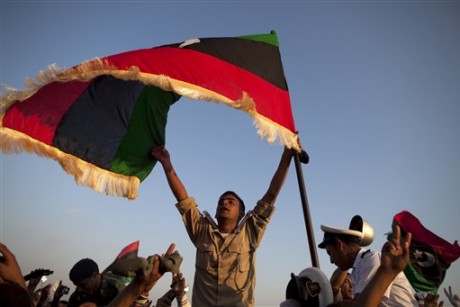By Robert W. Nicholson.

New York City, 15 November:
“Libya will become the United States of the . . .[restrict]Arab world,” predicts American risk consultant and entrepreneur Stephen Hollingshead. Needless to say, he’s a man staking an illustrious career on a rather risky proposition.
For many Americans who saw the images televised from Benghazi a few months ago, Hollingshead sounds insane. However, his prediction lines up well with the findings of a recent RAND report – not to mention attitudes among Libyans themselves – and suggests that Western worries about the outcome of the Arab Spring should not be over-exaggerated in this North African nation. Opportunities for friendship still remain strong.
Hollingshead, who holds a PhD in Politics from Marquette University and has advised major political figures in Washington (including a recent presidential candidate), recently created the Friends of Libya Foundation to raise donations and build grassroots support among Americans “for the purpose of improving, developing, and advancing Libyan society”.
He has sunk significant time and money into the project, and more importantly has bet his entire professional reputation on its success. After the Benghazi attacks, friends and colleagues have derided his vision as naïve and ill-advised. “Those people [the Libyans] just don’t like us”, he hears. But Hollingshead remains undeterred, pressing forward under the firm conviction that Libya (unlike some other nations affected by the Arab Spring) contains the core elements need for a flourishing liberal democracy.
His claims are not without reservation. “Libya will become the United States of the Arab world only if it can establish a firm rule of law without hampering the individual initiative and love of freedom that distinguish its culture from the others around it.” When pushed to answer what’s so unique about Libyan culture, Hollingshead draws comparisons with other countries in the Muslim world.
“When the state crumbled in Iraq and Afghanistan, citizens stood around, hands in pockets, and wondered when the Americans would turn the lights and water back on. In Libya, people just made things work themselves. There is a very strong American-style spirit of individual initiative.”
Hollingshead views Libya through the same lens that French thinker Alexis de Tocqueville viewed America almost two hundred years ago. “Libya has many of the social elements that allowed Tocqueville to predict (in 1835) that America would become the dominant global power. It is true that 42 years of totalitarian socialism has destroyed the knowledge base of social and commercial entrepreneurs…but the initiative that drives such efforts is alive and well in Libya to a degree not found in other Arab Spring countries.”
Hollingshead is not alone in believing that Libyan society is unique. RAND’s recent report notes the remarkable unity of Libyan society in comparison with other post-conflict states like Iraq and Bosnia. The report also points out the minimal gains made by Libyan Islamists in the recent elections. Unlike Egypt (where 74 per cent of parliamentary seats went to Islamist candidates) or Tunisia (where they captured 41 per cent), Libya saw only 21 per cent of the vote go to the Muslim Brotherhood. The avowedly Islamist Al-Wattan Party was shut out altogether. Of course, RAND does emphasise the critical need to strengthen Libya’s security establishment to prevent a repeat of the 9/11 Benghazi attack.
And what of that attack? Surely it undermines Hollingshead’s argument.
“The September 11 terrorist attack was not at all representative of the people of Libya,” he affirms, “or even of Benghazans, who marched, 30,000 strong out of a city smaller than Memphis, to condemn the attack. In fact, they burned down the compound of the group that carried out the attack, chasing them into the desert.” Hollingshead returns again to Libyan national character. “Libyans love freedom. They have security challenges like other countries in the region, but they appear to be taking steps to remedy that problem.”
Hollingshead’s goal is to convince Americans to seize on the abundant opportunities for partnering with the Libyan people in trade and development. “For American companies,” he says, “there is money to be made.” But money is not the only objective. “For America as a whole, we desperately need an ally in North Africa that is like us – a flourishing democratic and commercial power. Countries of the region will be more willing to imitate a flourishing Arab republic than to imitate us directly. Trade is our surest path to peace.”
The idea is captivating for Americans. Rather than watching the Arab Spring from a distance and fretting over its ultimate outcome, Hollingshead suggests that we may actually be able to help it succeed through goodwill. His program calls for active engagement of Libyan society through private trade, nonprofit investment, and grassroots capacity-building. He believes that effective American diplomacy can take place beyond the U.S. embassy, and he’s prepared to put his money where his mouth is.
Libya wants to succeed, he says, and its people have the requisite character to make that success a possibility. America’s job is to help that success take place, and not just for American or Libyan interests alone. “If Libya can get to its feet and establish itself,” he says, “it will become the glory of Africa.”
The glory of Africa. Now that’s an attractive prospect.
Robert W. Nicholson is an American lawyer and Tikvah Fellow in New York City. [/restrict]



